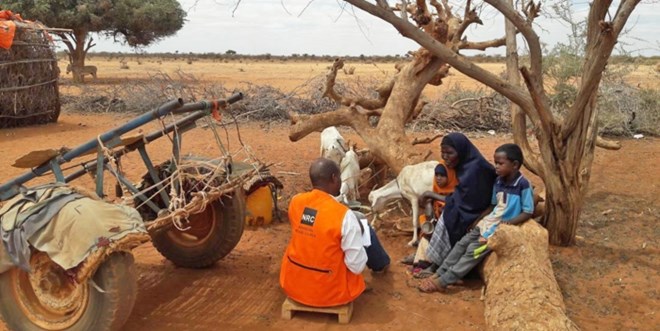Buying water when the rain fails

In southern Somalia, drought has killed people’s livestock and destroyed their crops. The Norwegian Refugee Council (NRC) provides cash aid to families depending on expensive water and food.
“It is painful.”
Widow and mother of five Faduma Ali Abdulahi describes how it feels when she and her children have to go to bed on an empty stomach.
Food has become too expensive.
Destroyed harvest
“Last year, we went to plant in March. In July, we came home empty-handed, because the rains failed.” But Faduma did not give up.
“In August, we went to plant again, but by October the lack of rain sent us home empty-handed a second time. The sorghum my family used to buy cheaply from the store is now very expensive,” she says.
Providing for five children
Faduma is one of many farmers struggling to survive in southern Somalia. In her home village of Garsobore in Gedo region, the drought has completely destroyed the harvest.
To make matters worse, Faduma has to provide for her family alone. Six years ago, her husband passed away, leaving her alone with five children.
The people of Gedo have lost their livelihoods as a result, and destitution has become widespread. Families have lost their livestock and farmers their crops. Rivers are drying up, leading to a reduction in harvests.
Water prices soar
Besides the drought extending from last year, the prices for basic commodities, such as water and food, have been soaring, making it even harder to survive for families like Faduma’s.
She says that prior to the drought, water was plentifully available, and she used to buy 20 liters of water for 500 Somali Shillings (USD 0.025).
Today, the same amount costs 16 times as much and the water is only available from trucks or when transported by donkey carts from as far as 15 kilometers away.
Villages dotted with dead animals
“With the growing drought, our sheep and goats became more of a burden than an asset. They gave us neither meat nor milk, but we had to provide for their feed and it became too expensive,” says Faduma.
In the end, she had to sell them at a throwaway price, except for three goats she still keeps.
Other families that did not sell their livestock early enough, are now counting huge losses. Some have lost all of their livestock to the drought. A walk through the village paints a clear picture of the extent of the crisis. The villages are dotted with carcasses of dead animals.
Only the donkeys survive
So far, Faduma’s three remaining goats have survived.
“Even animals known to endure drought are succumbing, that’s how severe the drought has become,” says Faduma.
She says they are shocked that even camels are dying.
Providing cash
In February 2017 NRC started Phase two of emergency cash programme in Garsobore village. The programme is funded through the UK Department of International Development (DFID). NRC works with the local authority of Dollow district to run the project.
Faduma and her family were among those selected to participate in the cash transfer relief programme. In total, 300 people in Dollow district participated. Each household receives USD 100 to help them pay for food, water and medical services.
Faduma Ali Abdulahi says taking part in the programme gives her hope for the future. “We received the first cash transfer through a mobile money transfer. This enabled me and others to get the money without travelling to the town, or to Hawala shops, which takes longer to deliver the funds,” she says.
The funds were processed quickly, and in less than two weeks’ time people were happy to receive their first cash disbursement.
The funds have since then been used to improve the lives of Faduma Ali Abdulahi and others in her community. She used her first cash disbursement to purchase food, water and to repay outstanding credit. The support has brought her relief and hope for her family’s future.
Relief Web